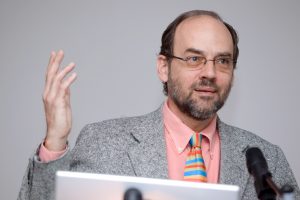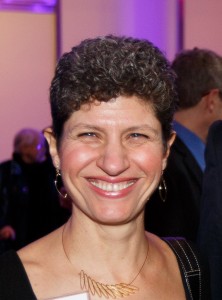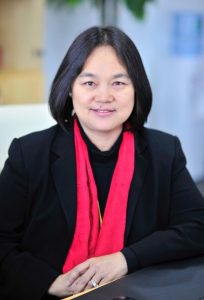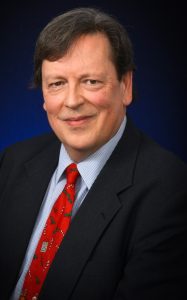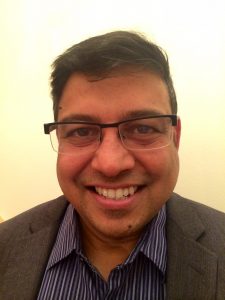Keynote Speakers
Edward Lee, Professor Electrical Engineering at U.C. Berkeley
Title: The Internet of Important Things
Abstract:
Cyber-physical systems are integrations of computation, communication networks, and physical dynamics. Applications include manufacturing, transportation, energy production and distribution, biomedical, smart buildings, and military systems, to name a few. Increasingly, today, such systems leverage Internet technology, despite a significant mismatch in technical objectives. A major challenge today is to make this technology reliable, predictable, and controllable enough for “important” things, such as safety-critical and mission-critical systems. In this talk, I will analyze how emerging technologies can translate into better models and better engineering methods for this evolving Internet of Important things.
About the speaker:
Edward A. Lee is the Robert S. Pepper Distinguished Professor in the Electrical Engineering and Computer Sciences (EECS) department at U.C. Berkeley. His research interests center on design, modeling, and analysis of embedded, real-time computational systems. He is the director of the nine-university TerraSwarm Research Center (http://terraswarm.org), a director of Chess, the Berkeley Center for Hybrid and Embedded Software Systems, and the director of the Berkeley Ptolemy project. From 2005-2008, he served as chair of the EE Division and then chair of the EECS Department at UC Berkeley. He is co-author of six books and hundreds of papers. He has led the development of several influential open-source software packages, notably Ptolemy and its various spinoffs. He received the B.S. degree in Computer Science from Yale University in 1979, the S.M. degree in EECS from the Massachusetts Institute of Technology (MIT) in 1981, and the Ph.D. degree in EECS from UC Berkeley in 1986. From 1979 to 1982 he was a member of technical staff at Bell Telephone Laboratories in Holmdel, New Jersey, in the Advanced Data Communications Laboratory. He is a co-founder of BDTI, Inc., where he is currently a Senior Technical Advisor, and has consulted for a number of other companies. He is a Fellow of the IEEE, was an NSF Presidential Young Investigator, and won the 1997 Frederick Emmons Terman Award for Engineering Education.
Elza Erkip, Professor of Electrical and Computer Engineering, New York University
Title: Cooperative Wireless Networking: Theoretical Foundations and 5G Applications
Abstract:
Foundations of cooperative networking have been extensively studied in the last 45 years, leading to a wide range of information and communication theoretic results establishing benefits of cooperation in various wireless scenarios. Many protocols have been developed to facilitate cooperation among terminals with remarkable improvements in communication rates and reliability. The impending 5G wireless revolution provides the perfect setting for implementing some of these protocols and reaping the potential gains of cooperation: Large number of antennas and wide bandwidth, as in millimeter wave systems, provide abundant degrees of freedom; full-duplex radio designs allow nodes to transcend traditional duplexing limitations; and applications such as Internet of Things provide a natural setting for cooperative communication and compression. This talk provides a brief overview of the theoretical foundations of cooperative communications along with a few examples suggesting how cooperation could significantly impact performance of future 5G wireless networks.
Biography:
Elza Erkip received the B.S. degree in Electrical and Electronics Engineering from Middle East Technical University, Turkey, and the M.S. and Ph.D. degrees in Electrical Engineering from Stanford University. Currently, she is a Professor of Electrical and Computer Engineering with New York University Tandon School of Engineering. Her research interests are in multiuser information theory, communication theory, and wireless communications.
Elza Erkip received the NSF CAREER award in 2001, the IEEE Communications Society Stephen O. Rice Paper Prize in 2004, the IEEE ICC Communication Theory Symposium Best Paper Award in 2007, and the IEEE Communications Society Award for Advances in Communication in 2013. She has been a member of the Board of Governors of the IEEE Information Theory Society since 2012 where she is currently the Second Vice President. She was a Distinguished Lecturer of the IEEE Information Theory Society from 2013 to 2014. She is a Fellow of the IEEE, a member of the Science Academy Society of Turkey and is among the 2014 and 2015 Thomson Reuters Highly Cited Researchers.
Elza Erkip has had many editorial and conference organization responsibilities. More recently, she was a Guest Editor of the IEEE JOURNAL ON SELECTED AREAS IN COMMUNICATIONS in 2015, a General Chair for the IEEE International Symposium of Information Theory in 2013 and an Associate Editor of the IEEE TRANSACTIONS ON INFORMATION THEORY in 2009-2011. She will be a Technical Chair of IEEE Wireless Communications and Networking Conference in 2017.
Frederick Scalera, Director of Public Safety Innovation with Brooks Bawden, LLC
Title: FirstNet the National Public Safety Network
Frederick Scalera joined Brooks Bawden, LLC in 2016. Previously, Fred served as Bureau Chief of the Interoperable Communications Bureau and the FirstNet State Point of Contact (SPOC) within The New Jersey Office of Homeland Security and Preparedness. New Jersey is one of only five (5) early builders of the National Public Safety Broadband Network (NPSBN). Through Fred’s leadership, JerseyNet, a deployable based LTE network, has become one of the leading early builder deployments.
Mr. Scalera has a long history of public safety service and innovation. Fred retired in 2008 as a Deputy Chief with the Nutley Fire Department in New Jersey. During his time with the Nutley Fire Department, Fred worked as an Arson Investigator assigned to the Essex County Prosecutor’s Office Arson Task Force. Fred became the first Fire Service Arson Investigator to attend a Police Academy. He served as an instructor at the Essex County Police Academy for over 25 years. Fred also created one of the first hazardous materials teams within the State of New Jersey. Working with the New Jersey State Police and the New Jersey Department of Health, Fred helped create standards for training and qualifications for hazardous material teams.
During Fred’s career with the Fire Service and Municipal Government he also became a Certified Fire Official and a Fire Sub Code Official under the New Jersey Construction Code. Other responsibilities included radio communications, the Township Information Technology Bureau, the Emergency Management Coordinator and the Township Safety Committee. Fred not only served his home Township of Nutley, but also within Essex County as a Deputy Sherriff, the Deputy Coordinator of the County Office of Emergency Management and the Hazardous Material Coordinator.
Fred also served in the New Jersey State Legislature. He rose to be the Deputy Speaker of the New Jersey General Assembly and the Chairman of the Homeland Security Preparedness Committee. Fred was also founder of the New Jersey Fire Caucasus.
After leaving Government in 2008, Fred became the Director of Public Safety Strategies for Alcatel-Lucent assigned to the Public Safety Broadband initiative in both the United States and Canada. Fred conducted the first successful LTE pilot in Las Vegas
Dr. Chih-Lin I
China Mobile Chief Scientist, Wireless Technologies
China Mobile Research Institute
Biography:
Chih-Lin I received her Ph.D. degree in electrical engineering from Stanford University. She has been working at multiple world-class companies and research institutes leading the R&D, including AT&T Bell Labs; Director of AT&T HQ, Director of ITRI Taiwan, and VPGD of ASTRI Hong Kong. She received the IEEE Trans. COM Stephen Rice Best Paper Award, is a winner of the CCCP National 1000 Talent Program, and has won the 2015 Industrial Innovation Award of IEEE Communication Society for Leadership and Innovation in Next-Generation Cellular Wireless Networks.
In 2011, she joined China Mobile as its Chief Scientist of wireless technologies, established the Green Communications Research Center, and launched the 5G Key Technologies R&D. She is spearheading major initiatives including 5G, C-RAN, high energy efficiency system architectures, technologies and devices; and green energy. She was an Area Editor of IEEE/ACM Trans. NET, an elected Board Member of IEEE ComSoc, Chair of the ComSoc Meetings and Conferences Board, and Founding Chair of the IEEE WCNC Steering Committee.
She was a Professor at NCTU, an Adjunct Professor at NTU, and currently an Adjunct Professor at BUPT. She is the Chair of FuTURE 5G SIG, an Executive Board Member of GreenTouch, a Network Operator Council Founding Member of ETSI NFV, a Steering Board Member of WWRF, a member of IEEE ComSoc SDB, SPC, and CSCN-SC, and a Scientific Advisory Board Member of Singapore NRF. Her current research interests center around “Green, Soft, and Open”.
Banquet Speaker:
Joe Jesson, CEO of RFSigint Inc.
Title: “Wireless Security Risks – Spanning 75 Years of Secure Information Myths”
ABSTRACT:
Joe discusses the incorrect assumptions and myths engineers and security experts made starting from 1941, “ENIGMA messages are completely secure and cannot be read” to currently (2016) stating “AES256 cannot be broken”. While initially exploring the history of encryption, Joe discusses the Bletchley Park preferred interception receiver, the 1941 RCA AR-88, which was located and procured in 2016 and being restored at the Sarnoff Museum on the campus of The College of New Jersey in Ewing, New Jersey. Slides following the years and wireless design practices,
Joe will illustrate how each new communication products, from Air Force 1 Comm to 2G Cellphones were compromised and he discussed how the new automotive and Internet of Things (IoT) technology which assumes (incorrectly) existing wireless security is secure and how the new very low-cost ($15) spectrum analyzers and open source data SDR baseband correlation tools is employed to analyze and decode, display, and regenerate the data protocols. Finally, Joe will show how he incorporated the 11941 AR88 RF design in his electronics active component lab by having the students simulate, in PSPICE and LTSPICE the AR-88 tracked RF sections and how the existing 1941 vacuum tube design compares to a modern FET RF design – given the AR-88 existing inductors and capacitors but changing the bias to reflect the differences between the Pentode Vacuum tube and the FET model.
Biography:
Joe Jesson is currently the CEO of RFSigint Inc, a Wireless IP/Patent advisory service. Patent claims are compared and mapped and expert witness offerings on IoT, M2M, Telematics, and Telemetry patents. Also, Joe is CTO for Assurenet Inc, a NY video telematics company and CTO of Able Devices, a wireless software expert on a SIM card. Joe is an engineering researcher on a DOT grant and teaches, as Adjunct and Visiting Professor at TCNJ, engineering classes and Labs. In 2007, Joe received the GE Edison Award by the Chairman of GE, Jeff Immelt, while CTO and co-founder of GE’s Asset Intelligence (now ID System’s Asset intelligence) IoT business. Joe was Instrumentation Engineer at the University of Chicago Jones laboratory and has advanced degrees from DePaul University.
Lunchtime Speaker:
Narayan Menon, CTO/EVP Engineering and Founder of XCellAir
ABSTRACT:
This talk covers the evolution trajectory of Wi-Fi, as it shapes up to address expanded deployment scenarios and new use cases. Wi-Fi is a well-entrenched wireless technology, but it is seeing significant deployment growth, as operators (MSOs and MNOs) create vastly expanded and densified Wi-Fi networks, and seek to offer value-adding, monetizable services over these networks. In addition, new use cases are emerging for Wi-Fi. Shared spectrum systems and the Internet of Things (IoT) are examples of avenues for Wi-Fi evolution. This talk discusses these growth avenues and the unique issues and requirements they present.
Biography:
At XCellAir, Narayan develops and evangelizes the technology strategy and roadmap, and leads the development of XCellAir’s cloud-based network management and optimization solutions. Prior to XCellAir, he drove research and development for InterDigital, developing next-generation wireless solutions – covering topics such as small cells and Wi-Fi, spectrum management, M2M/IoT and millimeter-wave technology. Narayan previously held leadership roles at Siemens Mobile Networks, Omnipoint Technologies and Hughes Network Systems in the development of TDMA, GSM/GPRS and 3G systems. Outside of work, Narayan follows a variety of sports and is an avid movie buff.
Narayan holds Engineering degrees from the Indian Institute of Technology, New Delhi and an Executive MBA from Hofstra University in New York.
Lunchtime Speaker:
Michael Langdon
Michael Langdon is Director, Engineering at Juniper Networks for the Contrail Business Unit where he supports field enablement for cloud and network services virtualization in an orchestrated architecture for service providers and enterprises. Michael is now on his second tour with Juniper. Starting in Juniper’s early years, Michael was a Sales Engineer working with carrier customers in the Northeast. After almost 13 years he joined start up Contrail Systems to build & lead their Sales Engineering team. Juniper acquired Contrail in late 2012 and Michael has been an Engineering Director since. Michael has helped customers design and build some of the largest and most reliable networks on the planet. Previously Michael worked as an ISP consultant to carrier networks and as operations and engineering manager for one of the original NSFNet backbones (JvNCNet). Michael is a graduate of Villanova University and started his career as an officer in the US Navy onboard a Knox class frigate. Michael is based in the New York City area.



